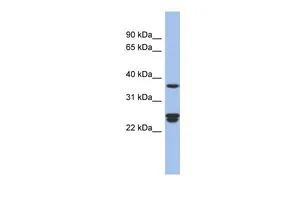
WB analysis of human fetal liver tissue using GTX45061 OAZ2 antibody at 0.2-1microg/ml.
OAZ2 antibody, Internal
GTX45061
ApplicationsWestern Blot
Product group Antibodies
ReactivityHuman
TargetOAZ2
Overview
- SupplierGeneTex
- Product NameOAZ2 antibody, Internal
- Delivery Days Customer9
- Application Supplier NoteWB: 0.2-2.5 ug/ml. *Optimal dilutions/concentrations should be determined by the researcher.Not tested in other applications.
- ApplicationsWestern Blot
- CertificationResearch Use Only
- ClonalityPolyclonal
- Concentration0.5-1 mg/ml
- ConjugateUnconjugated
- Gene ID4947
- Target nameOAZ2
- Target descriptionornithine decarboxylase antizyme 2
- Target synonymsAZ2, ornithine decarboxylase antizyme 2, ODC-Az 2
- HostRabbit
- IsotypeIgG
- Protein IDO95190
- Protein NameOrnithine decarboxylase antizyme 2
- Scientific DescriptionThe protein encoded by this gene belongs to the ornithine decarboxylase antizyme family, which plays a role in cell growth and proliferation by regulating intracellular polyamines. Expression of antizymes requires +1 ribosomal frameshifting, which is enhanced by high levels of polyamines. Antizymes in turn bind to and inhibit ornithine decarboxylase (ODC), the key enzyme in polyamine biosynthesis; thus, completing the auto-regulatory circuit. This gene encodes antizyme 2, the second member of the antizyme family. Like antizyme 1, antizyme 2 has broad tissue distribution, inhibits ODC activity and polyamine uptake, and stimulates ODC degradation in vivo; however, it fails to promote ODC degradation in vitro. Antizyme 2 is expressed at lower levels than antizyme 1, but is evolutionary more conserved, suggesting it likely has an important biological role. Studies also show different subcellular localization of antizymes 1 and 2, indicating specific function for each antizyme in discrete compartments of the cell. Alternatively spliced transcript variants have been found for this gene. [provided by RefSeq, Dec 2014]
- ReactivityHuman
- Storage Instruction-20°C or -80°C,2°C to 8°C
- UNSPSC12352203


